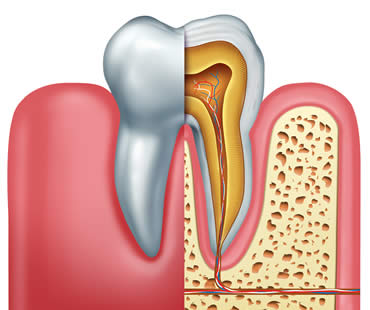
by Dr. Adkins | Jan 3, 2020 | Blog, Dental Topics 2, Root Canal Treatment
A toothache can make your life miserable. It may involve terrible tooth pain as well as headaches, sleeplessness, and difficulty eating. A trip to the dentist’s office is a must if you want relief. An examination might reveal that you need root canal treatment to save your tooth and eliminate your symptoms.
Severe tooth decay, a faulty crown, repeated tooth procedures or trauma are common causes of tooth damage. These issues can also lead to infection of your tooth’s pulp, which is on the inside of your tooth. Also called endodontic therapy, root canal treatment focuses on getting rid of the damaged tooth pulp. If infection is present, it is also removed. The root canal is thoroughly cleaned and disinfected, and then the area is filled with a special material called gutta-percha. Finally, the tooth is typically restored with a dental crown to provide maximum protection from future damage.
Some of the benefits you can expect from root canal treatment include chewing with normal biting force and sensation, maintaining natural tooth appearance, protecting other teeth from excessive wear, and avoiding a troublesome gap in the smile. In as little as one or two appointments, these benefits can be achieved without a great deal of discomfort. Innovations in technology have made the experience of root canal treatment usually no more painful or difficult than simply getting a dental filling. Once root canal treatment is complete, the tooth can last a lifetime with regular checkups and proper oral hygiene.
Schedule your appointment at our McDonough dental office

by Dr. Adkins | Nov 1, 2019 | Blog, Dental Topics 2, Root Canal Treatment
Have you been told that you may need a root canal treatment? Are you worried because of things you’ve heard in the media about how “awful” a root canal is? Don’t worry about what you’ve heard; endodontic therapy isn’t at all what you’d think. Let’s debunk some myths!
- Myth #1: Root canal treatment is very painful. This isn’t true! In fact, a root canal treatment is performed specifically to relieve a patient’s pain, not to cause more. After a root canal treatment, you might feel some tenderness, but the pain you felt when the damaged tissue and infection was still inside the tooth will be completely gone. Once the swelling from the procedure has gone down, you will be able to use your new tooth exactly the way you could use your natural tooth when it was completely healthy.
- Myth #2: Root canal therapy or other endodontic work can lead to disease elsewhere in the body. Another falsehood! Root canal treatments don’t spread disease to the rest of the body, rather, they remove infected tissue and bacteria from the body, preventing the affected tooth from becoming re-infected.
- Myth #3: Extraction is better than root canal treatment. Extraction is not preferred to root canal treatment! Whenever possible, it’s preferred to keep your natural tooth. Your natural tooth’s roots stimulate and preserve the bone of your jaw, as well as providing adequate support to the surrounding teeth. Dental implants or dental bridges can be problematic, both in function and in dietary restrictions. In fact, an extraction can lead to several prolonged appointments to perform replacement procedures, treatments that are far more involved than a root canal treatment.
Endodontic treatment is an extremely common dental procedure that can provide durable, long-lasting restorations that will function as your natural tooth did. If you believe you may need a root canal treatment, talk to your endodontist or dentist today to see how this successfully proven treatment can help you and your smile needs.
We treat patients from McDonough and the surrounding area

by Dr. Adkins | Jun 28, 2019 | Blog, Dental Topics 2, Root Canal Treatment
If you are dealing with ongoing tooth pain, you may be too fearful to go to the dentist to find out what’s going on. It’s important that you do, however, as you may need root canal therapy. Your dentist will need to evaluate you to see if that procedure is necessary, and will closely examine several factors: the signs the dentist can see personally, the results of any tests performed during your visit, and the symptoms you have been experiencing with the problematic tooth.
Your dentist may observe:
- A tooth that is discolored
- X-rays that reveal a tooth problem
- A fistulous tract, or persistent or recurring gum pimple
Additional testing done by your dentist:
- X-rays provide an extremely clear picture of the health of the tooth
- Thermal testing can evaluate sensitivity through a careful application of hot or cold temperatures
- Percussion testing evaluates pain response through gentle tapping
You may have been noticing:
- A broken or cracked tooth obviously decayed or damaged
- A discolored tooth, especially a grey tooth
- A “bubble” in your gums, like a pimple. It may or may not have ruptured, leaking pus that smells or tastes awful
- Pain that shoots out from one tooth to your jaw or ear, leading to earache symptoms
- Pain that prevents you from living your life without painkillers
- Pain, sensitivity or swelling on one certain tooth
- Extreme sensitivity to hot or cold liquids that lingers and is very painful
In some cases, an infected tooth that requires a root canal treatment has no symptoms at all that could be discerned by you. Only a dental professional can confirm the need to undergo root canal therapies. If you are experiencing pain that disrupts your life, talk to your dentist or endodontist immediately. Root canal treatments are designed to relieve the pain you’re experiencing now and to restore your tooth to full form and function. Don’t wait to get your life and smile back!
Our dental office is located in McDonough





 770-957-5214
770-957-5214  E-Mail Us
E-Mail Us 
